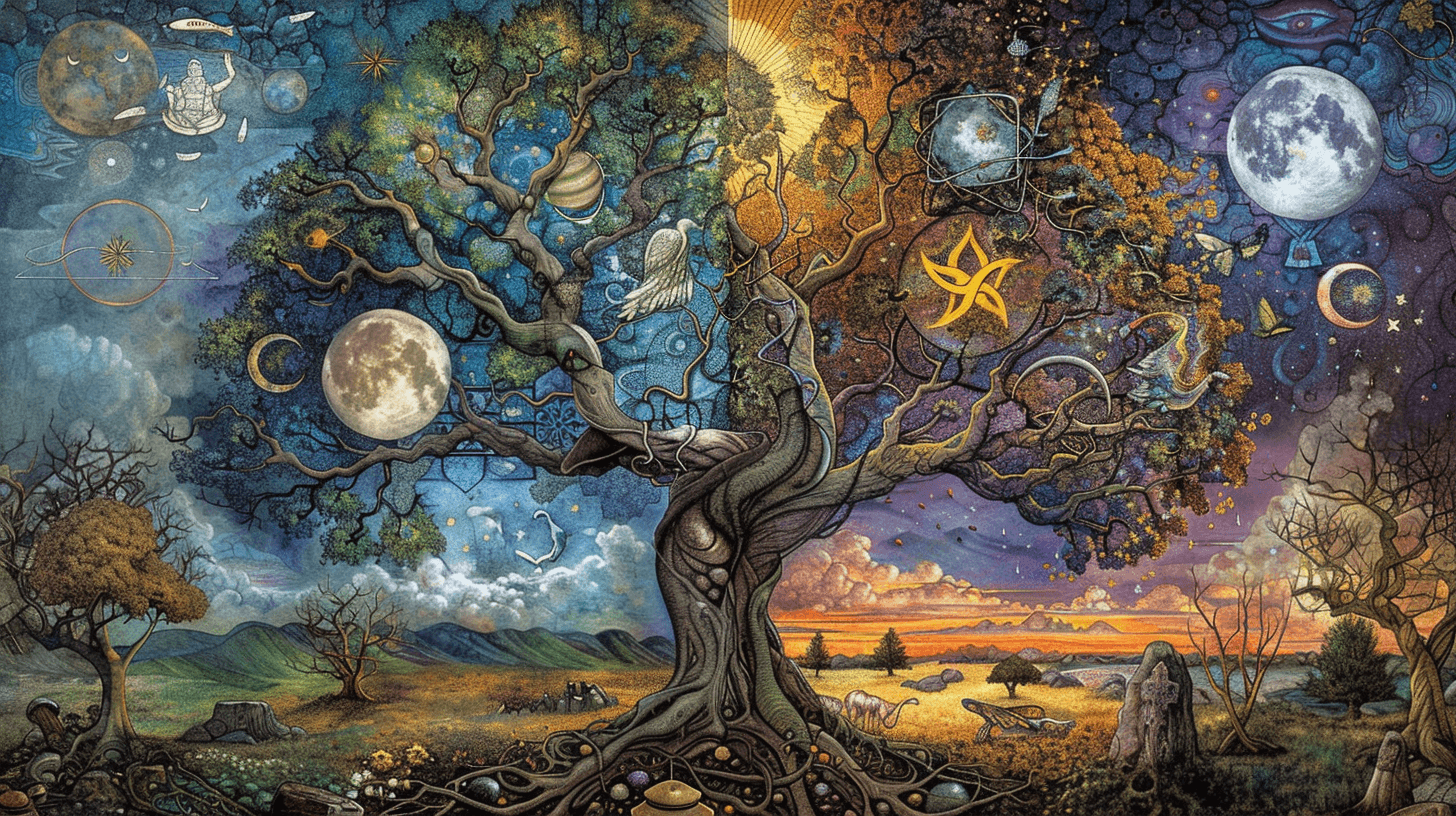Introduction: The Quest for Deeper Spiritual Understanding

In an age of rapid technological advancement and unprecedented access to information, the search for deeper spiritual understanding has taken on new significance. As individuals navigate the complexities of modern life, many find themselves yearning for something more—a connection to something greater than themselves, a sense of purpose that transcends the material world. This quest for deeper spiritual understanding is not just about finding answers to existential questions; it’s about embarking on a transformative journey that reshapes how we see ourselves and the world around us.
At its core, spiritual understanding is about cultivating a deeper awareness of the interconnectedness of all things. It’s about recognizing that our lives are part of a larger, more intricate tapestry that weaves together the physical, emotional, mental, and spiritual dimensions of existence. But how do we deepen this understanding? How do we move beyond surface-level practices to truly integrate spiritual principles into our daily lives?
This article aims to guide you on this journey by deconstructing conventional assumptions about spirituality and offering profound, novel insights grounded in research and forward-thinking ideas. We will explore various practices, philosophies, and teachings that can help you deepen your spiritual understanding and transform your life from within. Whether you are a seasoned spiritual practitioner or just beginning your journey, this guide will provide you with the tools and inspiration to expand your inner awareness and live a more fulfilling, purpose-driven life.
The Foundation of Spiritual Understanding

To board on a journey of deepening spiritual understanding, it is essential first to define what we mean by “spiritual understanding.” At its most basic level, spiritual understanding refers to the awareness and comprehension of the spiritual dimension of life—the recognition that there is more to existence than the physical world and that we are part of something greater than ourselves.
However, to truly grasp the concept of spiritual understanding, we must go beyond simplistic definitions. From a first principles perspective, spiritual understanding can be seen as the process of aligning our consciousness with the underlying truths of the universe. It involves not just intellectual knowledge but also experiential wisdom—a direct, felt sense of connection to the divine, the universe, or the higher self.
In this context, spiritual understanding is an evolving process, one that deepens over time as we engage in practices that expand our awareness and refine our perception. It is not a static state to be achieved but a dynamic journey of continual growth and transformation.
Why Deepening Spiritual Understanding Matters
Why should we strive to deepen our spiritual understanding? The benefits are manifold, affecting not only our inner lives but also how we interact with the world around us.
Enhanced Self-Awareness: At the heart of spiritual understanding is self-awareness—the ability to see ourselves clearly, without the distortions of ego, fear, or societal conditioning. As we deepen our spiritual understanding, we become more attuned to our inner world, recognizing the patterns of thought, emotion, and behavior that shape our experiences. This heightened self-awareness allows us to make more conscious choices, leading to greater alignment between our actions and our true values.
Inner Peace and Resilience: A deeper spiritual understanding often brings a sense of inner peace, as we learn to navigate life’s challenges with greater equanimity. By cultivating practices that connect us to our inner selves and the greater whole, we build resilience against the stresses and uncertainties of life. This inner peace is not about avoiding difficulties but about approaching them with a calm, centered mindset that is rooted in a broader perspective.
A Greater Sense of Purpose: As we deepen our spiritual understanding, we begin to see our lives in the context of a larger purpose. We recognize that our existence is not random but part of a greater plan, and this awareness infuses our actions with meaning and intention. Whether through service, creativity, or simply living in alignment with our values, we find fulfillment in contributing to the greater good.
Personal Transformation: Ultimately, deepening spiritual understanding leads to personal transformation. As we integrate spiritual principles into our daily lives, we become more compassionate, empathetic, and connected to others. Our relationships improve, our sense of fulfillment grows, and we experience life with a sense of wonder and gratitude.
The Journey of Spiritual Growth
The journey of spiritual growth is a lifelong process that involves continually deepening our understanding of ourselves and the world around us. This journey is not linear; it involves cycles of learning, unlearning, and relearning as we encounter new experiences and insights.
One of the most important aspects of this journey is the recognition that spiritual growth is not about achieving a final destination but about embracing the process of growth itself. It’s about being open to the lessons that life offers and being willing to change and evolve in response to those lessons.
To support this journey, it is essential to cultivate a mindset of curiosity and openness. Spiritual growth requires us to question our assumptions, challenge our beliefs, and explore new ways of thinking and being. It also requires us to be patient and compassionate with ourselves, recognizing that growth takes time and that setbacks and challenges are part of the process.
Practices to Deepen Your Spiritual Understanding

Mindfulness and Meditation
One of the most powerful practices for deepening spiritual understanding is mindfulness—the practice of being fully present in the moment, without judgment or attachment. Mindfulness allows us to become more aware of our thoughts, emotions, and physical sensations, helping us to develop a deeper connection to our inner selves.
Meditation is a specific form of mindfulness that involves focusing the mind on a particular object, thought, or activity to achieve a state of mental clarity and emotional calm. There are many different forms of meditation, each with its own unique benefits:
Mindfulness Meditation: This form of meditation involves paying attention to the present moment without judgment. By observing our thoughts and feelings as they arise, we learn to accept them without becoming attached to them. Over time, this practice can lead to greater self-awareness and emotional regulation.
Loving-Kindness Meditation: Also known as Metta meditation, this practice involves cultivating feelings of love and compassion for oneself and others. By repeating phrases such as “May I be happy” and “May you be safe,” we develop a sense of connection to all beings and a greater capacity for empathy.
Transcendental Meditation: This form of meditation involves silently repeating a mantra to transcend ordinary thought and reach a state of pure consciousness. Transcendental meditation is known for its ability to reduce stress and promote deep relaxation.
Each of these forms of meditation offers a unique pathway to deepening spiritual understanding. By cultivating a regular meditation practice, we can quiet the mind, connect with our inner selves, and gain insights into the nature of our existence.
Self-Reflection and Journaling
Self-reflection is the practice of looking inward to examine our thoughts, feelings, and behaviors. It is a powerful tool for deepening spiritual understanding, as it allows us to gain insight into our inner world and identify areas where we may be out of alignment with our values.
Journaling is a practical way to engage in self-reflection. By writing down our thoughts and feelings, we can explore them more deeply and gain clarity on our experiences. Journaling also allows us to track our spiritual growth over time, providing a record of our journey and the lessons we’ve learned.
To get started with journaling, consider the following prompts:
What am I feeling right now? Why do I feel this way?
What are my core values, and how am I living in alignment with them?
What lessons have I learned from recent experiences?
How can I deepen my spiritual understanding today?
By regularly engaging in self-reflection and journaling, we can gain deeper insights into ourselves and our spiritual journey.
Exploring Sacred Texts and Teachings
Sacred texts from various spiritual traditions offer profound insights into the nature of existence and the principles that guide spiritual growth. Whether it’s the Bhagavad Gita, the Bible, the Tao Te Ching, or the teachings of the Buddha, these texts provide wisdom that can help us deepen our spiritual understanding.
When exploring sacred texts, it’s important to approach them with an open mind and a willingness to engage with the material on a deep level. Rather than simply reading the words, take time to reflect on their meaning and how they apply to your own life.
One way to deepen your understanding of sacred texts is through contemplative reading, also known as “lectio divina.” This practice involves reading a passage slowly and reflectively, allowing the words to resonate within you. After reading, spend time in silence, reflecting on the passage and listening for any insights or guidance that may arise.
Another approach is to study sacred texts in a group setting, where you can share your reflections and insights with others. This can provide new perspectives and deepen your understanding of the material.
Engaging in Spiritual Retreats and Workshops
Spiritual retreats and workshops offer an immersive experience that can help deepen your spiritual understanding. These events provide an opportunity to step away from the distractions of daily life and focus entirely on your spiritual growth.
Retreats often include a combination of meditation, yoga, teachings, and group discussions, creating a supportive environment for deep spiritual exploration. Whether it’s a silent meditation retreat, a yoga retreat, or a workshop on a specific spiritual topic, these experiences can provide new insights and help you connect more deeply with your spiritual path.
In addition to formal retreats, consider creating your own personal retreat at home. Set aside a day or weekend to disconnect from technology, spend time in nature, and engage in spiritual practices that nourish your soul.
Practicing Compassion and Service
Compassion is a fundamental aspect of spiritual understanding, as it connects us to others and fosters a sense of unity with all beings. By practicing compassion, we cultivate a heart-centered approach to life that deepens our spiritual awareness.
One way to practice compassion is through acts of service. Whether it’s volunteering at a local charity, helping a neighbor, or simply offering a kind word to someone in need, acts of service allow us to express our compassion in tangible ways. These actions not only benefit others but also deepen our own spiritual understanding by reminding us of our interconnectedness.
In addition to external acts of compassion, it’s important to practice self-compassion. This involves being gentle with ourselves, especially when we make mistakes or face challenges. By treating ourselves with the same kindness and understanding that we offer to others, we can deepen our spiritual understanding and cultivate greater inner peace.
Exploring Different Spiritual Paths and Philosophies

Eastern Philosophies and Practices
Eastern spiritual traditions such as Buddhism, Hinduism, and Taoism offer rich teachings that can deepen our spiritual understanding. These traditions emphasize the interconnectedness of all life and the importance of aligning our actions with the natural flow of the universe.
Buddhism: Central to Buddhist teachings is the concept of impermanence—the understanding that all things are in a constant state of change. By recognizing the impermanent nature of life, we can let go of attachments and cultivate a sense of equanimity. Buddhism also teaches the practice of mindfulness, which helps us stay present and aware in each moment, deepening our spiritual understanding.
Hinduism: Hinduism offers a diverse array of spiritual teachings, including the concepts of karma (the law of cause and effect), dharma (one’s duty or purpose in life), and moksha (liberation from the cycle of birth and death). By studying these concepts and applying them to our lives, we can deepen our understanding of the spiritual principles that govern existence.
Taoism: Taoism emphasizes living in harmony with the Tao, the natural order of the universe. Taoist practices such as Tai Chi and Qigong help us cultivate inner balance and flow with the rhythms of life. By aligning ourselves with the Tao, we can deepen our spiritual understanding and experience greater peace and harmony.
Western Spiritual Traditions
Western spiritual traditions, including Christianity, Kabbalah, and mysticism, offer unique insights into the nature of the divine and the spiritual path.
Christianity: Central to Christian teachings is the concept of divine love—a love that is unconditional and all-encompassing. By cultivating a relationship with the divine through prayer, contemplation, and acts of love, we can deepen our spiritual understanding and experience the presence of God in our lives.
Kabbalah: Kabbalah is a mystical tradition within Judaism that offers a deep exploration of the nature of the divine and the spiritual dimensions of existence. Through the study of Kabbalistic texts and practices such as meditation and visualization, we can gain insights into the mysteries of the universe and deepen our spiritual understanding.
Mysticism: Mysticism, found in various religious traditions, involves the direct experience of the divine or ultimate reality. Mystics often describe their experiences as encounters with a profound sense of unity and oneness. By studying the writings of mystics and engaging in practices that cultivate direct spiritual experiences, we can deepen our understanding of the divine and our connection to it.
Modern Spirituality and New Age Practices
In recent years, there has been a growing interest in modern spirituality and New Age practices, which emphasize personal empowerment, holistic healing, and the integration of mind, body, and spirit.
Personal Empowerment: Modern spirituality often emphasizes the importance of personal empowerment—the belief that we have the power to shape our own lives and create our own reality. This perspective encourages us to take responsibility for our thoughts, feelings, and actions, and to use spiritual practices to manifest our highest potential.
Holistic Healing: Holistic healing practices, such as Reiki, energy healing, and crystal therapy, are popular in the New Age movement. These practices focus on balancing the mind, body, and spirit, recognizing that physical health is intimately connected to our emotional and spiritual well-being. By exploring these practices, we can deepen our spiritual understanding and promote healing on all levels.
Integration of Science and Spirituality: Modern spirituality often seeks to bridge the gap between science and spirituality, recognizing that both can offer valuable insights into the nature of reality. By exploring the intersections of quantum physics, neuroscience, and spirituality, we can deepen our understanding of the universe and our place within it.
Integrating Science and Spirituality
The integration of science and spirituality offers a powerful framework for deepening our spiritual understanding. While science provides us with empirical knowledge about the physical world, spirituality offers insights into the metaphysical dimensions of existence. By bringing these two perspectives together, we can gain a more holistic understanding of reality.
Quantum Physics and Spirituality: Quantum physics has revealed that the universe is far more complex and interconnected than we once thought. Concepts such as non-locality and entanglement suggest that all things are interconnected at a fundamental level. These ideas resonate with spiritual teachings that emphasize the oneness of all life. By exploring the parallels between quantum physics and spirituality, we can deepen our understanding of the interconnected nature of existence.
Neuroscience and Spirituality: Neuroscience has also provided valuable insights into the nature of consciousness and the brain’s role in spiritual experiences. Studies have shown that meditation and other spiritual practices can change the brain’s structure and function, promoting greater well-being and spiritual awareness. By understanding the neuroscience of spirituality, we can gain a deeper appreciation for the mind-body connection and the transformative power of spiritual practices.
Psychology and Spirituality: Psychology offers tools for understanding the human mind and behavior, which can be valuable in deepening our spiritual understanding. Concepts such as self-actualization, flow states, and the unconscious mind provide insights into the psychological aspects of spiritual growth. By integrating psychological principles with spiritual practices, we can create a more comprehensive approach to personal development.
Common Challenges in Deepening Spiritual Understanding

Overcoming Spiritual Doubts and Uncertainty
On the path of deepening spiritual understanding, it is common to encounter doubts and uncertainties. These challenges are a natural part of the journey, as they prompt us to question our beliefs and explore new perspectives.
To overcome spiritual doubts, it is important to embrace them as opportunities for growth. Rather than seeing doubt as a sign of weakness, view it as a catalyst for deeper exploration. Engage in practices such as meditation, prayer, and contemplation to gain clarity and reconnect with your inner guidance.
It can also be helpful to seek support from spiritual mentors or communities. Engaging in conversations with others who have faced similar doubts can provide reassurance and new insights. Remember that spiritual growth is a dynamic process, and periods of uncertainty often precede significant breakthroughs.
Avoiding Spiritual Bypassing
Spiritual bypassing is the tendency to use spiritual practices or beliefs to avoid dealing with unresolved emotional or psychological issues. This can manifest as an overemphasis on positivity, denial of negative emotions, or avoidance of difficult situations.
To avoid spiritual bypassing, it is important to integrate spirituality with emotional healing. This means acknowledging and processing difficult emotions rather than suppressing them. Practices such as shadow work, therapy, and journaling can help us confront and heal unresolved issues, allowing for a more authentic and grounded spiritual practice.
It is also important to recognize that spirituality is not about escaping the challenges of life but about embracing them as opportunities for growth. By facing our fears, insecurities, and wounds, we can deepen our spiritual understanding and cultivate greater resilience and compassion.
Balancing Spiritual Practice with Daily Life
One of the challenges of deepening spiritual understanding is integrating spiritual practices into a busy, modern life. It can be difficult to find time for meditation, reflection, and other spiritual activities amidst the demands of work, family, and social obligations.
To balance spiritual practice with daily life, it is important to prioritize and simplify. Start by identifying the practices that are most meaningful to you and find ways to incorporate them into your daily routine. This could mean setting aside a few minutes each morning for meditation, practicing mindfulness during daily activities, or dedicating one day a week to spiritual study.
It is also important to recognize that spiritual practice is not limited to formal activities. Everyday moments can be opportunities for deepening spiritual understanding. By approaching daily tasks with mindfulness and intention, we can infuse our lives with spiritual awareness and create a sense of sacredness in the ordinary.
The Role of Community and Fellowship in Spiritual Growth

Community plays a vital role in deepening spiritual understanding. Being part of a spiritual community provides support, inspiration, and a sense of belonging. It allows us to share our experiences, learn from others, and grow together on the spiritual path.
To find a spiritual community, start by exploring local groups, spiritual centers, or online forums that resonate with your interests and values. Consider attending events, workshops, or retreats where you can connect with like-minded individuals. If you can’t find a community that meets your needs, consider creating one by starting a meditation group, book club, or discussion circle.
Building a spiritual community is not just about finding others who share your beliefs but about creating a space where everyone feels welcome and supported. Emphasize inclusivity, open-mindedness, and mutual respect as foundational principles of your community.
Participating in Group Practices
Engaging in group spiritual practices can deepen your understanding and provide a sense of connection and shared purpose. Whether it’s meditation circles, prayer groups, or study circles, participating in group practices allows you to experience the collective energy and wisdom of the community.
Group practices also provide opportunities for learning and growth. By discussing spiritual teachings, sharing personal experiences, and practicing together, you can gain new insights and perspectives that enhance your spiritual understanding.
Consider organizing or joining regular group practices in your community. This could involve weekly meditation sessions, monthly study groups, or seasonal retreats. The key is to create a consistent and supportive environment where everyone can deepen their spiritual understanding and grow together.
Mentorship and Spiritual Guidance
Having a spiritual mentor or guide can be invaluable in deepening your spiritual understanding. A mentor provides personalized support, helping you navigate challenges, explore new practices, and gain deeper insights into your spiritual journey.
To find a spiritual mentor, start by identifying someone whose wisdom and experience you admire. This could be a teacher, a community leader, or someone who has walked a similar spiritual path. Approach them with humility and a willingness to learn, and be open to their guidance and feedback.
If you’re unable to find a mentor in person, consider seeking guidance from books, online courses, or virtual communities. Many spiritual teachers offer mentorship programs or online classes that can provide the support and guidance you need.
Personal Stories and Reflections: Learning from the Journeys of Others

Personal stories of spiritual growth offer valuable lessons and inspiration for deepening your own understanding. These stories demonstrate the challenges, breakthroughs, and transformative experiences that shape the spiritual journey.
Consider the story of someone who faced a significant life challenge—a loss, a health crisis, or a major life transition—that led them to explore their spiritual beliefs more deeply. Through their journey, they discovered new practices, insights, and a greater sense of purpose. Their story highlights the importance of perseverance, openness, and the willingness to embrace the unknown.
Another example could be someone who grew up in a secular environment but later felt a calling to explore spirituality. Their journey involved studying different traditions, experimenting with various practices, and eventually finding a path that resonated with their inner truth. Their story illustrates the power of curiosity, exploration, and self-discovery in deepening spiritual understanding.
Lessons Learned from Spiritual Teachers
Renowned spiritual teachers offer timeless wisdom that can guide us on our journey. By studying their teachings and reflecting on their experiences, we can gain deeper insights into the nature of spirituality and how to apply it in our lives.
For example, Thich Nhat Hanh’s teachings on mindfulness and compassionate living offer practical guidance for deepening spiritual understanding. His emphasis on being fully present in each moment and cultivating a heart of compassion provides a foundation for living a spiritually enriched life.
Similarly, Pema Chödrön’s teachings on embracing uncertainty and finding peace in difficult times resonate with those seeking to deepen their spiritual understanding amidst life’s challenges. Her wisdom on working with fear, pain, and discomfort offers valuable tools for navigating the spiritual journey with grace and resilience.
Reflections on the Path Forward
As you continue your journey of deepening spiritual understanding, it’s important to regularly reflect on your progress and set intentions for further growth. Take time to assess your current practices, beliefs, and challenges, and consider the steps you can take to deepen your understanding.
Reflect on the following questions:
What spiritual practices have been most meaningful to me, and how can I deepen them?
What challenges have I faced on my spiritual journey, and how can I overcome them?
How can I integrate spiritual principles more fully into my daily life?
What new teachings or practices can I explore to expand my spiritual understanding?
By regularly reflecting on your spiritual journey, you can stay aligned with your intentions and continue to grow in your understanding and awareness.
Conclusion: Embracing the Journey of Spiritual Understanding

Deepening your spiritual understanding is a dynamic and transformative journey—one that requires curiosity, openness, and a commitment to continuous growth. By exploring various practices, philosophies, and teachings, you can expand your awareness, cultivate greater self-awareness, and connect more deeply with the divine, the universe, and your true self.
This journey is not about achieving a final state of enlightenment but about embracing the process of growth itself. It’s about being open to the lessons that life offers and being willing to change and evolve in response to those lessons.
As you move forward, remember that the journey of deepening spiritual understanding is unique to each individual. There is no one-size-fits-all approach; instead, it’s about finding the practices and teachings that resonate with your inner truth and support your personal growth.
Take the first step today by exploring one of the practices or teachings discussed in this article. Whether it’s starting a meditation practice, engaging in self-reflection, or joining a spiritual community, each step you take will bring you closer to a deeper, more meaningful understanding of yourself and the world around you.
Now is the time to embrace the journey of deepening your spiritual understanding. Let your curiosity guide you, let your heart open to new experiences, and let your spirit soar to new heights of awareness and connection.







